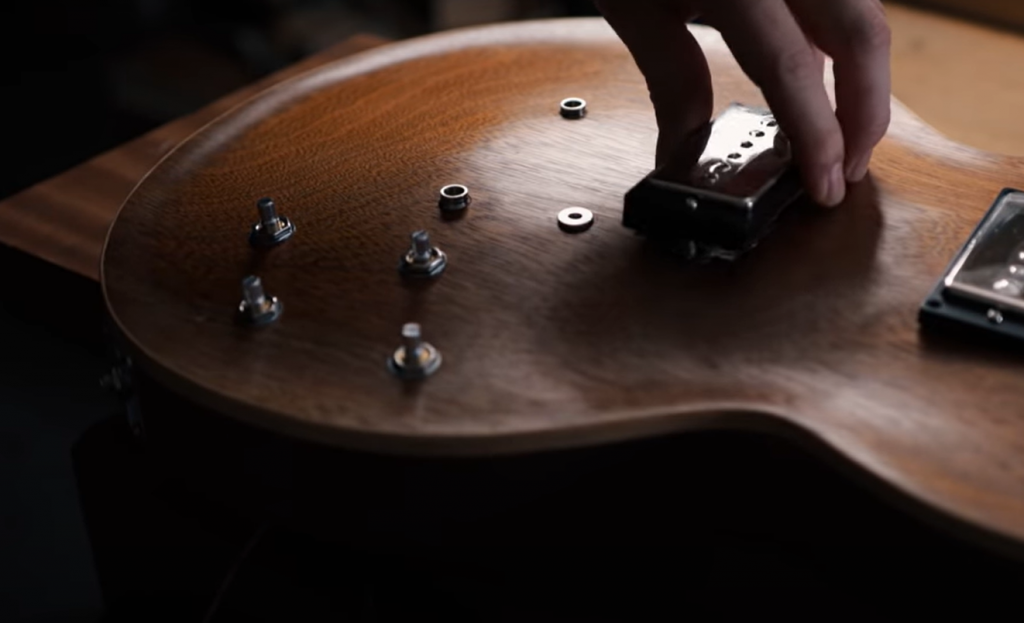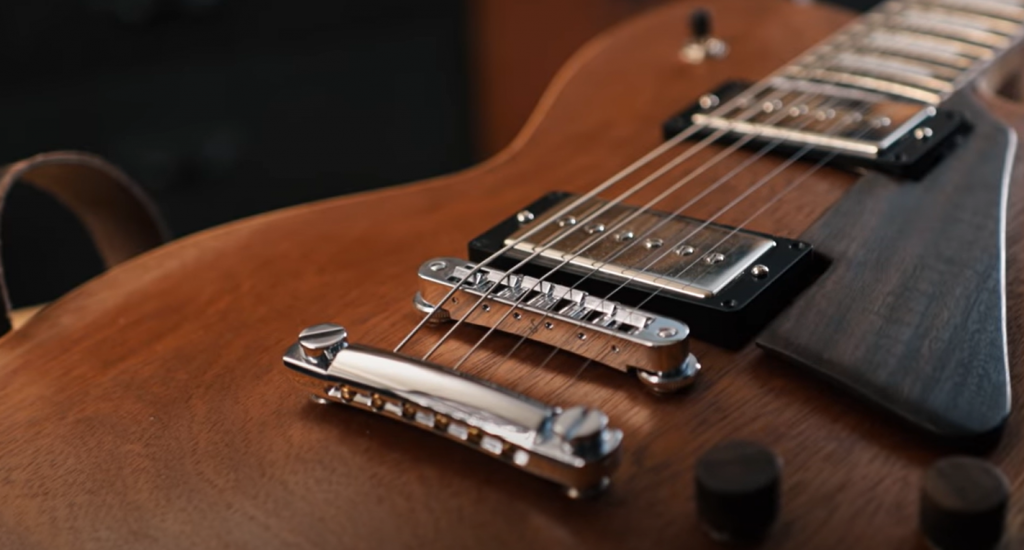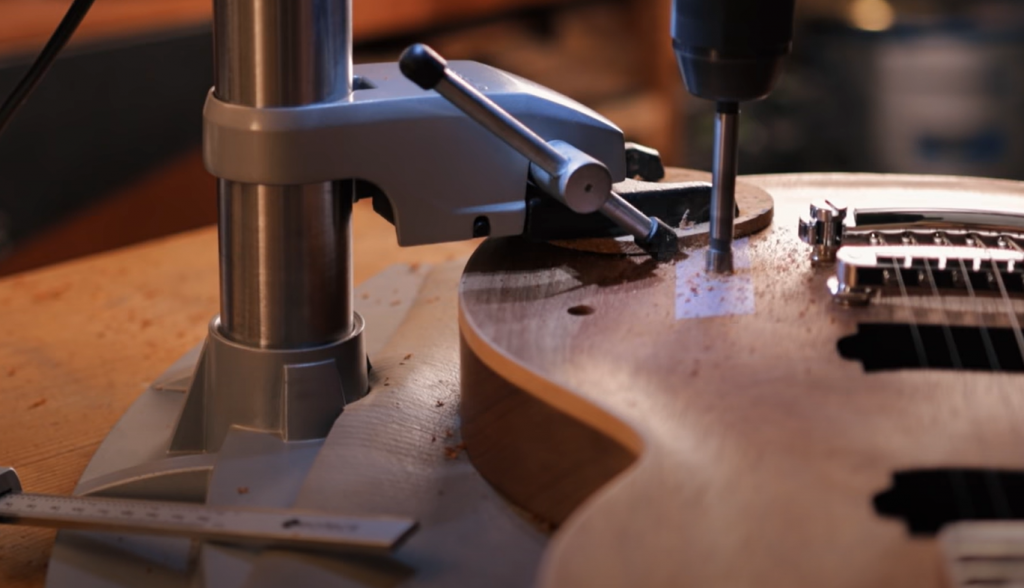Electric guitars come in a variety of shapes and sizes, and with that comes a range of weights. While the weight of an acoustic guitar is often a non-issue, electric guitars can be heavier or lighter, depending on the model. In this article, we will answer some common questions about electric guitar weight. We’ll also provide tips on how to find the right electric guitar for your needs!
Table of Contents
What Impacts a Guitar’s Weight
There are a few factors that can impact the weight of an electric guitar. The first is the size and shape of the guitar. A larger guitar will generally weigh more than a smaller one. The second factor is the materials used to construct the guitar. Guitars made with heavier wood will be heavier than those made with lighter wood. Finally, the hardware on the guitar can also add to its weight. Heavy-duty guitars with lots of metal hardware will be heavier than those with less hardware.
Type of Wood
The type of wood used for the body of the guitar, can play a significant role in its weight. For example, a guitar made with a mahogany body will be heavier than one made with alder. Mahogany is a dense wood that adds considerable weight to the guitar. Alder, on the other hand, is much lighter. As such, it is often used in the construction of lightweight guitars.

In general, solid-body electric guitars are going to be heavier than their hollow-body counterparts. This is due to the fact that solid-body guitars have more mass. Hollow-body guitars are typically lighter because they have less material overall.
The density of the wood isn’t the only factor that determines an electric guitar’s weight. The thickness of the wood also plays a role. A thicker piece of wood will obviously weigh more than a thinner one.
Guitars with thick bodies are typically heavier than those with thin bodies. This is because there is more material in a thick-bodied guitar. Due to their reduced weight, thin-bodied guitars are frequently lighter.
Also the finish which covers the guitar can affect its final weight. A guitar with a heavy finish will weigh more than one with a light finish. Heavy finishes add weight to the guitar, while light finishes do not.
Body Shape and Size
The shape and size of an electric guitar’s body can have a big impact on its weight. For example, a Les Paul is going to be heavier than a Stratocaster. This is because the Les Paul has a larger body. The Stratocaster, on the other hand, has a smaller body. As such, it is often used by players who are looking for a lighter guitar.
Body style can lead the weight of the guitar to one or another side. A solid-body guitar is going to be heavier than hollow-body guitar. This is because solid-body guitars have more mass overall.
Finally, the weight of an electric guitar can be affected by the type of bridge used on the instrument. A guitar with a heavy-duty bridge is going to be heavier than one with a lighter bridge. This is because the heavy-duty bridge adds weight to the guitar.
In general, electric guitars with bigger bodies are going to be heavier than those with smaller bodies. This is due to the fact that there is more material in a larger guitar. Smaller guitars are often lighter because they have less mass overall.
Body Type
The sound part of the guitar, or the top of the guitar, has a strong influence on the volume of the guitar. Woods that transmit sound well, such as spruce, are commonly used for soundboards.
Examples of Electric Guitar Weight and Dimensions
Now that we’ve gone over some of the factors that affect an electric guitar’s weight, let’s take a look at some specific examples.
The Gibson Les Paul is a solid body guitar that typically weighs between nine and ten pounds. The Fender Stratocaster is another popular solid body guitar. It generally weighs between six and seven pounds. If you’re looking for a lighter guitar, the Epiphone Casino semi-hollow body guitar weighs in at around five and half pounds.
Les Paul Weigh
The Les Paul has been around since 1952 and is one of the most popular guitars in the world. It’s used by some of the biggest names in music, including Jimmy Page, Slash, and Mark Knopfler. Weight of the Les Paul can differ because of the materials that are used during its production.[1]
Stratocaster Weight
The Stratocaster was first introduced in 1954 and has been used by some of the most iconic guitarists of all time, including Jimi Hendrix, Eric Clapton, and John Frusciante.
Weight of this guitar can range from six to seven pounds.
Telecaster Weight
The Telecaster typically weighs between seven and eight pounds.

Many famous guitarists loved this guitar and played it at their concerts, gigs and shows. Musicians like Jeff Beck, Keith Richards and Bruce Springsteen give credit to this guitar for its clear and hard sound.
Gibson SG Weight
The Gibson SG is a solid body guitar that typically weighs between eight and nine pounds.
The SG’s weight can vary depending on the materials used in its construction, but it typically falls within the range of eight to nine pounds.PRS Custom 24 Weight
The PRS Custom 24 is one of the most popular electric guitars on the market, and for good reason. It’s a versatile guitar that can be used for a variety of genres, from country to metal.
First, it’s important to note that there are different types of PRS Custom 24s. There’s the original Custom 24, which weighs in at around eight pounds. Then there’s the PRS SE Custom 24, which is a bit lighter at seven pounds. And finally, there’s the PRS S²Custom 24, which is the lightest of the bunch at just over six pounds.
So what’s the difference between these three guitars? Well, it all comes down to the materials used in their construction. The original Custom 24 is made with a mahogany body and maple top, while the SE and S² models are both made with basswood bodies and maple tops.
But if you’re looking for a bit more heft and sustain, then the original Custom 24 is probably your best bet. Whichever model you choose, you’re sure to get a great sounding guitar that will last you a lifetime.Light Guitar Vs Heavy Guitar
Now that we’ve gone over the weight of the PRS Custom 24, let’s talk about how that weight affects the sound of the guitar. In general, lighter guitars tend to have a brighter sound, while heavier guitars have a richer, fuller sound.
Lighter guitars are also easier to play for extended periods of time since they don’t put as much strain on your arm and shoulder. Heavier guitars are great for players who want a big sound without having to rely on pedals or amps to get there.
So which is better? Light or heavy? Well, it all comes down to personal preference. If you’re looking for an easy-to-play guitar with a bright sound, then a light guitar is probably your best bet. But if you’re after a heavier sound with more sustain, then a heavy guitar is the way to go. Ultimately, it’s up to you to decide which type of guitar is right for your playing style.
Lightweight Guitars
Here are just a few of our favorite lightweight guitars:
- The Fender Stratocaster weighs in at around seven pounds, making it one of the lightest electric guitars on the market. It’s perfect for players who want a bright, twangy sound.
- The PRS SE Custom 24 is the lightest guitar on this list, weighing in at just over six pounds. If you’re looking for a versatile guitar that’s easy to play, then this is the perfect option for you.

No matter what your playing style is, there’s sure to be a lightweight guitar that’s perfect for you.
Heavyweight Guitars
Now that we’ve talked about the weight of the PRS Custom 24, let’s take a look at some other heavyweight guitars. As we previously stated, heavier guitars have a more robust, full tone. They’re also ideal for players who wish to create a big sound without the use of pedals or amplifiers.
Here are just a few of our favorite heavyweight guitars:
- The Gibson Les Paul Standard is one of the most popular electric guitars on the market. It weighs in at around nine pounds, making it one of the heaviest guitars on this list. If you’re looking for a guitar with amazing sustain and a thick, rich sound, then this is the perfect option for you.
- The Epiphone Casino is another great option for players who want a heavy sound. It weighs in at just over eight pounds, making it one of the heavier guitars on this list. If you’re looking for a guitar that’s easy to play and has a big, bold sound, then this is the perfect option for you.
Does Guitar Weight Affect Tone?
While playing the guitar, you probably felt the vibrations of the instrument – these are mechanical vibrations of a certain frequency. The more pronounced these vibrations and the better they spread, the fuller the final sound of the instrument.
The vibrations of the wood directly affect the vibrations of the strings, which are transmitted to the pickups – hence the importance of using quality materials in stringed instruments. But, if pickups, strings, and the sound processing path still play the main role in electric guitars, then in acoustic and classical guitars the material has always been and will be the main element for the formation of a high-quality tone.
The most common type of guitar material is wood. As mentioned above, some musicians pay attention only to the quality of the pickups, not paying attention to the wood, while others consider the type of wood to be the most important characteristic. However, both are right. The wood for the guitar sets the overall character of the sound – that’s a fact. There are sawdust guitars that sound awful, and even the best pickups won’t make them good for anything other than beer accompaniment.
If we are talking about an electric guitar of the middle class, then the influence of wood on the sound is often exaggerated here. The most important structural element is the guitar neck.
For example, the necks of Telecaster-type guitars are most often made of maple, which has sonority (telecasters are just loved for their sonority). Mahogany makes the sound softer and lengthens the sustain.Do Lighter Guitars Sound Better?
This is a common question, and there are two schools of thought on the matter. Some guitarists believe that a lighter guitar will have a more “resonant” sound because it vibrates more easily. Others believe that a heavier guitar will have better sustain because the added weight prevents the strings from vibrating as quickly.
There is no right or wrong answer here; it ultimately comes down to personal preference. If you’re looking for a light guitar, we recommend checking out our list of the best electric guitars under $500. For something with more mass, take a look at our roundup of the best metal guitars.
There are pros and cons to both lighter and heavier guitars, with plenty of examples on each side.
How to Weigh a Guitar
The weight of a guitar can vary depending on the materials used and the overall size of the instrument. A good way to get an accurate measurement is to use a digital scale.

If you don’t have access to a digital scale, there are a few other methods you can try. One is to weigh yourself holding the guitar, then weigh yourself without the guitar and subtract the difference. Another is to hang the guitar from a hook or door knob and use a regular analog scale (the kind with a needle) to measure its weight.
Keep in mind that these methods are not as accurate as using a digital scale, but they will give you a general idea of how much your guitar weighs.
FAQ
Does the weight of a guitar matter?
At the end of the day, it’s up to you whether or not the weight of your guitar matters. If you find that a lighter or heavier guitar suits your playing style better, then go for it! However, don’t worry too much about the weight of your instrument; as long as it feels comfortable to play, that’s all that really matters.
What is a good weight for a guitar?
This is a question that doesn’t have a straightforward answer. Different people have different opinions on what is the “ideal” weight for a guitar. In general, though, most people seem to agree that a good weight for a guitar is one that is comfortable for the player.
There are many factors that can affect how comfortable a guitar is to play, such as the size and shape of the body, the type of neck, and even the material used in construction. However, weight is often cited as one of the most important factors in determining how comfortable a guitar is to play.
Some players prefer lighter guitars because they are easier to hold and play for extended periods of time. Others find that heavier guitars have a more substantial feel and provide better tone. Ultimately, it is up to the player to decide what weight is best for them.
If you are unsure about what weight is right for you, it is always best to try out a few different guitars before making a purchase. As such, feeling your guitar in your hands will help you to find out which one would work for you.
No matter what weight you prefer, remember that the most important thing is that the guitar feels comfortable for you to play. As long as it meets this criteria, the weight of your guitar shouldn’t matter too much.
Are electric guitars heavy?
This is a common question that people have when they are first considering buying an electric guitar. The short answer is that electric guitars can be heavy, but they don’t have to be.

Many different factors affect the weight of an electric guitar, such as the type of body, the materials used in construction, and even the size of the instrument. However, in general, most electric guitars weigh between six and twelve pounds.[2]
Of course, there are always exceptions to this rule. Some guitars may be lighter or heavier than others, depending on the specific model and construction. However, in general, most electric guitars will fall within this weight range.
So if you are wondering whether or not an electric guitar is too heavy for you, the best thing to do is to try one out and see how it feels. Each person is different, and what may be comfortable for one player may not be comfortable for another.
If you find that an electric guitar is too heavy for you, there are a few things you can do to make it more manageable. For example, some players find that using a strap can help take some of the weight off their shoulders.
Others find that adjusting the action or bridge height can make the guitar easier to play. Ultimately, though, it is up to the player to decide what makes them most comfortable. [3]
What is the heaviest electric guitar?
The heaviest electric guitar on record is the Gibson Les Paul Studio Bass, which weighs in at a whopping thirteen pounds. This guitar was designed specifically for bass players, and its heavy weight helps to create a deep, rich sound. [4]
Of course, not all bass players need or want a thirteen-pound guitar. Many find that such a heavy instrument is difficult to play. However, if you are looking for the heaviest electric guitar available, the Gibson Les Paul Studio Bass is definitely worth checking out.
So if you are wondering how much an electric guitar weighs, it depends on the specific model and construction. In general, most electric guitars will weigh between six and twelve pounds. However, there are always exceptions to this rule.

Some guitars may be lighter or heavier than others, depending on the materials used in construction and the specific design of the instrument. If you are concerned about the weight of an electric guitar, it is always best to try out a few different models before making a purchase. This way, you can get a feel for how each one feels in your hands and see which one suits your playing style the best.
Useful Video: How Much does your Electric Guitar Weigh? PRS, Stratocaster, Telecaster, Gibson and Yamaha Weight
Conclusion
In conclusion, the electric guitar is a musical instrument that has been around for many years and continues to be popular among musicians. While there are many different types of guitars on the market, the electric guitar is typically heavier than other types. This is due in part to the additional hardware and electronics that are included in the design.
References:
- https://guitargearfinder.com/faq/electric-guitar-weight/
- https://proaudioland.com/news/guitar-weight-effect-tone/
- https://guitarplayerhq.com/why-are-electric-guitars-so-heavy/
- https://prosoundhq.com/how-much-electric-guitars-weight-with-examples/






Leave a Reply